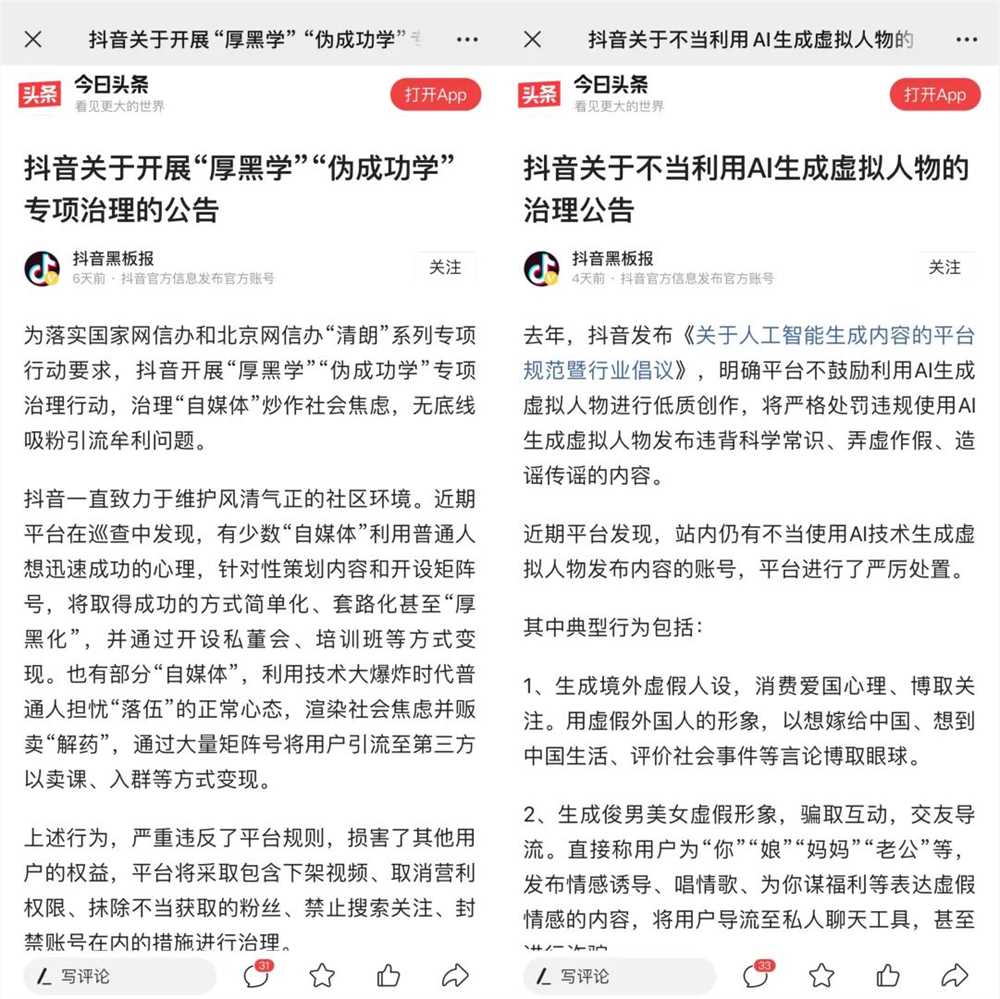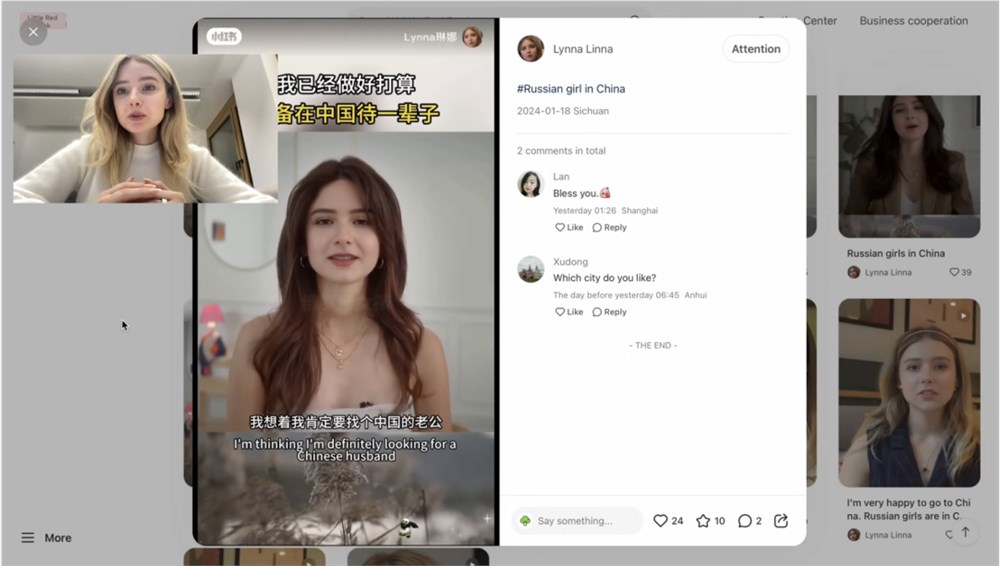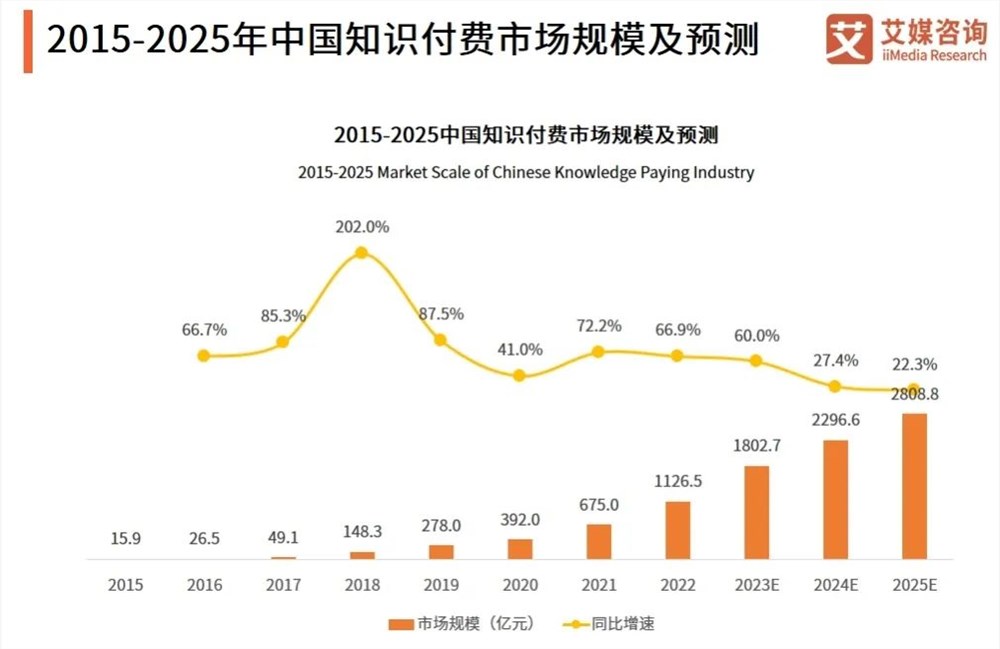Another batch of accounts inTik Tok"It's cold."
Recently, "Li Yizhou", "Sea Cucumber Brother", "dada" and many otherKnowledge paymentThe main account of the blogger-like Douyin cannot be searched, and the distribution is mainly based on slices.Matrix AccountThere is also “very little left”.

In addition, some accounts that improperly used AI to generate virtual characters were also removed from the Douyin platform. For example, they created fake overseas personas to attract attention, created fake images of handsome men and beautiful women to make friends and attract traffic, or created fake personas of elites to publish pseudo-success stories and other bad content.
The rectification of this batch of accounts is a heavy blow by Douyin against the "leek cutting" content.
From March 25 to March 26, Douyin released two governance announcements in succession, namely, special governance of "thick black studies" and "pseudo success studies", and improper use of AI to generate virtual characters. In the announcement, Douyin mentioned that these two types of accounts have the common "cutting leeks" behaviors such as low-quality fan attraction and selling courses.

The two consecutive governance announcements sparked widespread discussion among practitioners, with some bloggers even calling it the "knowledge payment earthquake."
What violations are there in the content of these accounts? What impact will this round of governance have on the content ecosystem of Douyin? How can practitioners in the knowledge payment and AI track create content in a benign and compliant manner?
Douyin strikes hard at "leek-cutting" content
199 yuanAI ClassNot only did Li Yizhou be nicknamed the "AI Godfather", but it also brought to light the gray business of selling courses by hyping up social anxiety.
Left: OpenAI founder Altman, right: Li Yizhou
In February this year, Sora became popular and soldAI CoursesThe famous Li Yizhou also became the focus of the topic. The "Artificial Intelligence Course for Everyone" on his sales window is priced at 199 yuan. According to the Douyin data tool Xindou under Xinbang, the estimated sales of this course in the past year are nearly 250,000 copies, and the cumulative estimated sales of his live broadcasts are nearly 50 million.
According to actual testing by the Xinbang editorial department, it was found that Li Yizhou's AI classes frequently conveyed anxiety, with comments such as "AI is becoming more and more like humans, it will be too late if you don't learn it now" and "grasping the AI trend means grasping the wallet".
Since the quality of the AI course was not as deep and professional as Li Yizhou advertised, many netizens questioned whether he was "cutting leeks".Whole networkRemoved from shelves.
AI courses are not what Li Yizhou is interested in.FirstHe has previously shared relevant knowledge such as short video practice and IP case analysis. The paid course under his name "Yizhou Yike" is priced at 2,980 yuan. It mainly completes the course sales conversion by attracting fans through short videos and attracting new users through live broadcasts.

In May 2022, Li Yizhou revealed in a video that the number of users of "Yizhou Yike" has exceeded 20,000
Compared with paid courses that cost hundreds or thousands of yuan, private board meetings, which often have a membership threshold of tens of thousands of yuan, appear to be more "stylish".
Private board meetings, also known as private sharing meetings, usually refer to the gathering of heads of different companies to share resources. With the development of the Internet, the members of private board meetings have become more popular online. For example, Cheng Qian, who "fought" with Zhou Hongyi in January this year, has a private board meeting called "Dengxian Research Society" with an annual membership fee of 59,800 yuan.
However, some internet celebrities who founded private board meetings took advantage of the desire of ordinary people to succeed quickly, simplifying, routineizing, and even "cheating" the ways to success, pursuing only commercial monetization, resulting in uneven quality of private board meetings.
Take the example of "Sea Cucumber Brother" who was restricted from searching in this round of Douyin governance. He became famous for selling sea cucumbers. He once launched paid financial and emotional quotient courses, and attracted users to join private board meetings through offline courses. He once said in a tweet that there are 2,000 entrepreneurs in his private board meeting. Calculated at 80,000 yuan per person, the income from this alone reached 160 million yuan.
However, according to Bianniu.com, some netizens reported that "Sea Cucumber Brother" was recruiting students for a private board meeting in the name of "Gulfstream Entrepreneurs Alliance", but "Sea Cucumber Brother" was unable to provide proof of the legitimacy of this so-called "Entrepreneurs Alliance" organization.
It is worth mentioning that from "Li Yizhou" to "Sea Cucumber Brother", a large number of matrix accounts were opened when planning content to spread sliced videos, with fans ranging from 100,000 to 1 million. At present, these matrix accounts are basically restricted from search by Douyin. Douyin officials also mentioned in the special governance announcement of "thick black studies" and "pseudo success studies" that the platform will take measures including removing videos, canceling profit rights, erasing improperly obtained fans, prohibiting searches and attention, and banning accounts to manage them.
In addition to selling "thick black studies" in the form of real people, there are also accounts that use AI to generate virtual characters for low-quality creations, and publish content that violates scientific common sense, is fraudulent, and spreads rumors to "scam" people.
For example, some accounts use AI to generate images of foreigners and have them recite chicken soup texts in English: "Ten principles of being a human being", "Eight cognitions of human nature, if you understand them all, you will understand life", etc. Some users who are not familiar with AI may believe the content of such accounts and be led to promote courses.
During the Spring Festival this year, Ukrainian internet celebrity Olga Loiek released a video titled "I was cloned in China", saying that her face and voice appeared in dozens of Chinese video accounts through AI technology, and she was selling goods, with more than 200,000 fans.

The announcement on Douyin's special crackdown on the improper use of AI to generate virtual characters mentioned that it will focus on tackling three types of content: the use of AI to generate fake foreigners, fake elites, and the use of AI-generated images to deceive interactions.At the same time, Douyin also uses models, technical recognition capabilities and other means to conduct long-term systematic identification, discovery and disposal.
According to the observation of the Xinbang editorial department, most of the Douyin videos currently generated by AI will have a reminder below that "The content is suspected to be generated by AI, please identify carefully."
After the industry earthquake,
How can practitioners operate efficiently and in the long term?
As the new regulations on Douyin’s governance came out, bloggers have said that they have been affected, among which paid knowledge bloggers have been affected more widely.
In addition to top paid knowledge bloggers such as "Li Yizhou" and "Sea Cucumber Brother", some mid-level bloggers with tens to hundreds of thousands of fans have also been blocked and restricted, or had their products deducted from the shelves by stores. This has been described as a "major knowledge payment earthquake."Some of the bloggers said that they were "accidentally injured" and immediately adjusted their content and filed a complaint with Douyin in order to restore normal operation of their accounts.
According to the observation of the Xinbang editorial department, although Douyin has issued a special governance announcement, it is not a comprehensive "ban" on the knowledge payment track, but rather to enable its healthy and long-term development by establishing more complete rules and systems.
A paid knowledge blogger told the Xinbang editorial department that the focus of this governance is not to sell anxiety to ordinary people, and not to over-exaggerate the kind of rhetoric such as “I made money/achieved success in some way, and you can get results as long as you learn from me.”Behind this, on the one hand, is the blogger's simple definition of success, that is, making money is success; on the other hand, is the one-sided attribution of success, similar to that success can be achieved by ordering paid courses or joining a private board meeting.
He also added that before the new regulations were introduced, Douyin had already conducted a round of illegal deductions on the knowledge payment track, mainly including improper promises,permanentLooking back, guiding and joining third-party communities, etc., "the essence of these rounds of governance actions is for bloggers to return to the essence of knowledge payment, rather than using the gimmicks of founders and CEOs to promote traffic and return the market to healthy competition."
Despite the chaos in the industry, the development prospects of the knowledge payment industry have still attracted much attention in recent years.
According to iMedia Consulting data, the scale of China's knowledge payment market will reach 112.65 billion yuan in 2022, an increase of about 70 times compared with 2015. It is estimated that by 2025, this market scale will further expand to 280.88 billion yuan.

Faced with a market worth over 100 billion yuan, on the one hand, it requires sound governance and guidance from content platforms such as Douyin; on the other hand, it also requires practitioners to have a long-term operational perspective rather than just making quick money.
Take knowledge payment in the field of AI as an example.As AI technology develops at a rapid pace, users may be overwhelmed by anxiety in the context of information explosion, thus creating opportunities to "rip off" users simply by reselling information gaps.
However, at this stage, the user experience and production effects of AI products are still some distance away from maturity, so some AI courses have limited output of practical content, and most of them are still theoretical frameworks. If practitioners take shortcuts and launch so-called "professional deep AI courses", it is essentially the same as "cutting leeks".
It is undeniable that every era has its own knowledge payment bonus period, and the key lies in how to operate efficiently and in the long term.
Through a series of rectifications on the "leek-cutting" behaviors in the fields of knowledge payment and AI generation, Douyin will burst various chaos and bubbles one by one. This will not only protect the rights and interests of users, but also promote the formal and long-term development of knowledge payment and AI content, bringing more possibilities to Douyin's content ecology.